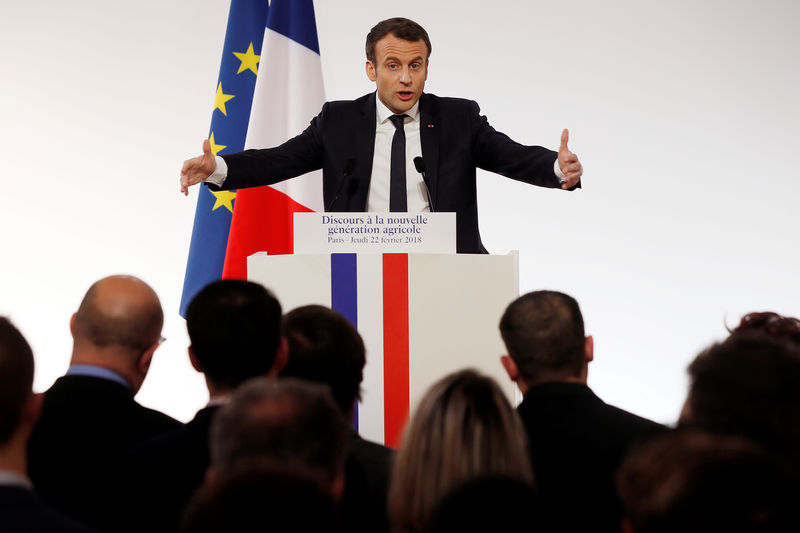 © Reuters. French President Emmanuel Macron delivers a speech to the young French farmers invited at the Elysee Palace before the opening of the 2018 Paris International Agricultural Show in Paris
© Reuters. French President Emmanuel Macron delivers a speech to the young French farmers invited at the Elysee Palace before the opening of the 2018 Paris International Agricultural Show in ParisPARIS (Reuters) – France will clamp down on farmland purchases by foreign buyers, President Emmanuel Macron said on Thursday, responding to a controversy over deals attributed to a Chinese firm.
While Chinese investors have acquired a number of wine estates and formed partnerships with dairy companies in France, the purchase of 2,600 hectares of cropland in central France over the past two years has hit a nerve in the European Union’s biggest agricultural producer.
Speaking to a gathering of young farmers at the Elysee presidential palace, Macron said farmland was a matter of sovereignty.
“We cannot let hundreds of hectares be bought up by foreign powers without knowing what the aim of these purchases is,” he said. “We are therefore clearly going to put in place regulatory safeguards in this area.”
Macron did not specify which investments he was referring to but French farming groups and media have cited Chinese fuel services group Hongyang as the buyer of the land acquired in 2016 and 2017.
The previous government of Francois Hollande tried to increase oversight of land sales after the first of the cropland deals in 2016 showed a loophole in vetting of farmland sales, but the move was blocked by France’s constitutional court.
Hongyang could not be immediately reached for comment.
Macron said access to land for young French farmers was a vital issue as the country faced the prospect of 40 percent of today’s farmers retiring by 2020.
The president organized Thursday’s reception in a gesture to the farming world ahead of the annual Paris farm show this weekend, and as the government faces discontent among farmers over issues including trade talks with South American countries.
Fusion Media or anyone involved with Fusion Media will not accept any liability for loss or damage as a result of reliance on the information including data, quotes, charts and buy/sell signals contained within this website. Please be fully informed regarding the risks and costs associated with trading the financial markets, it is one of the riskiest investment forms possible.
Source: Investing.com
























